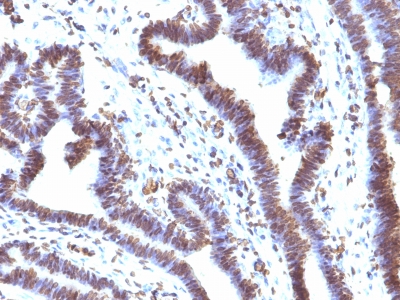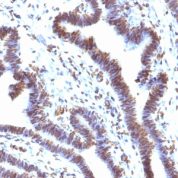Human Anti-EMI1 Antibody Product Attributes
Species: Human
Tested Applications: Flow Cytometry, Immunofluorescence, Western Blot, Immunohistochemistry (IHC).
Application Notes: Flow Cytometry (0.5-1ug of antibody/million cells in 0.1ml), Immunofluorescence (0.5-1ug of antibody/ml), Western Blot (1-2ug of antibody/ml for 60 minutes at RT), Immunohistochemistry (IHC) (Formalin-fixed) (0.5-1ug of antibody/ml for 30 minutes at RT)
Clonality: Monoclonal
Anti-EMI1 Antibody Clone: EMI1/1176
Clone EMI1/1176 Host and Isotype: Mouse IgG2a kappa
Anti-Human EMI1 Positive Control Sample: HeLa, 293 or HepG2 cells. Ovarian carcinoma.
Cellular Localization of Antibody Nuclear
Buffer and Stabilizer: 1mM PBS with 0.05% BSA & 0.05% azide.
Antibody Concentration: 200ug/ml
Antibody Purification Method:Protein A/G Purified
Immunogen: Recombinant fragment (203 amino acid residues between aa 1-250) of human EMI1 protein
Storage Conditions: Store at 2 to 8° C (refrigerate). Stable for 24 months when properly stored.
EMI1 Previously Observed Antibody Staining Patterns
Observed Subcellular, Organelle Specific Staining Data:
Anti-FBXO5 antibody staining is expected to be primarily localized to the nucleoplasm.Observed Antibody Staining Data By Tissue Type:
Variations in EMI1 antibody staining intensity in immunohistochemistry on tissue sections are present across different anatomical locations. An intense signal was observed in cells in the tubules in kidney and Purkinje cells in the cerebellum. More moderate antibody staining intensity was present in cells in the tubules in kidney and Purkinje cells in the cerebellum. Low, but measureable presence of EMI1 could be seen inadipocytes in mesenchymal tissue, bile duct cells in the liver, cells in the granular layer in cerebellum, cells in the red pulp in spleen, cells in the white pulp in spleen, decidual cells in the placenta, endothelial cells in the cerebral cortex, exocrine glandular cells in the pancreas, follicle cells in the ovary, glandular cells in the appendix, cervix, uterine, fallopian tube, parathyroid gland, prostate, salivary gland, seminal vesicle, small intestine, stomach and thyroid gland, glial cells in the caudate nucleus and hippocampus, hepatocytes in liver, islets of Langerhans in pancreas, lymphoid tissue in appendix, myocytes in heart muscle, neuronal cells in the hippocampus, neuropil in cerebral cortex, ovarian stroma cells in the ovary, squamous epithelial cells in the cervix and uterine. We were unable to detect EMI1 in other tissues. Disease states, inflammation, and other physiological changes can have a substantial impact on antibody staining patterns. These measurements were all taken in tissues deemed normal or from patients without known disease.Observed Antibody Staining Data By Tissue Disease Status:
Tissues from cancer patients, for instance, have their own distinct pattern of EMI1 expression as measured by anti-EMI1 antibody immunohistochemical staining. The average level of expression by tumor is summarized in the table below. The variability row represents patient to patient variability in IHC staining.| Sample Type | breast cancer | carcinoid | cervical cancer | colorectal cancer | endometrial cancer | glioma | head and neck cancer | liver cancer | lung cancer | lymphoma | melanoma | ovarian cancer | pancreatic cancer | prostate cancer | renal cancer | skin cancer | stomach cancer | testicular cancer | thyroid cancer | urothelial cancer |
|---|---|---|---|---|---|---|---|---|---|---|---|---|---|---|---|---|---|---|---|---|
| Signal Intensity | - | - | + | ++ | ++ | + | ++ | - | + | + | + | ++ | ++ | + | ++ | + | + | - | ++ | ++ |
| FBXO5 Variability | ++ | ++ | ++ | ++ | ++ | ++ | ++ | ++ | ++ | ++ | +++ | ++ | ++ | ++ | ++ | ++ | ++ | + | ++ | ++ |
Limitations and Warranty
enQuire Bio's EMI1 Anti-Human Monoclonal is available for Research Use Only. This antibody is guaranteed to work for a period of two years when properly stored.





There are no reviews yet.